Daily Vocabulary Words: List of Daily Used Words in Leading International Newspapers
Hi there. Welcome to this special section @ Wordpandit.
Our endeavour here is very simple: to highlight important daily vocabulary words, which you would come across in leading newspapers in the country. We have included the following newspapers in our selection:
• The New York Times
• The Washington Post
• Scientific American
• BBC
• The Guardian
• Psychology Today
• Wall Street Journal
• The Economist
We are putting in extensive work for developing your vocabulary. All you have got to do is be regular with this section and check out this post on a daily basis. This is your repository of words that are commonly used and essentially, we are posting a list of daily used words. Hence, this has significant practical application as it teaches you words that are used commonly in leading publications mentioned above.
Visit the website daily to learn words from leading international newspapers.
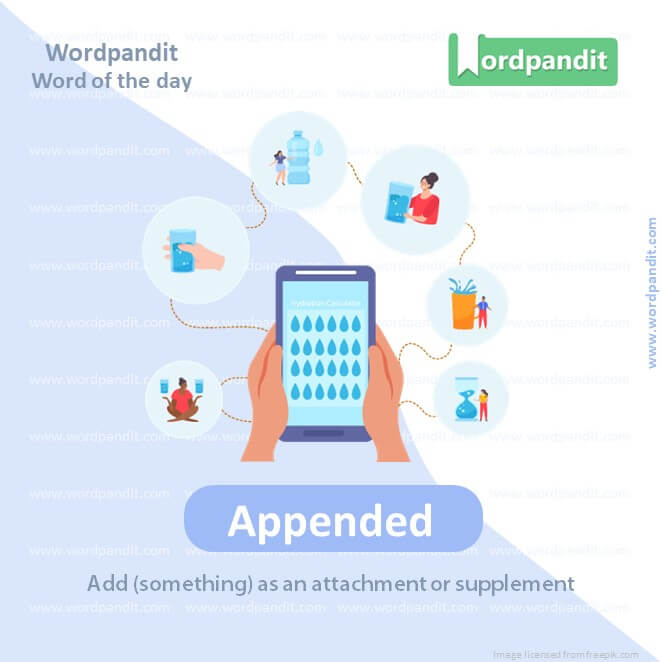
WORD-1: Appended
CONTEXT: The newly appended section of the manuscript threw light on the author’s real intentions.
SOURCE: The New York Times
EXPLANATORY PARAGRAPH: Imagine you have a toy train, and you attach one more carriage at its end. You’ve just “appended” a carriage. When we “append” something, we’re adding it to the end of something else.
MEANING: Add (something) as an attachment or supplement (verb)
PRONUNCIATION: uh-PEN-ded
SYNONYMS: Attach, Add on, Affix, Join, Annex, Supplement, Tag on
USAGE EXAMPLES:
1. She appended a note to the end of her letter.
2. The document was appended with the latest updates.
3. All relevant data is appended to the report.
4. The teacher appended comments to each student’s essay.
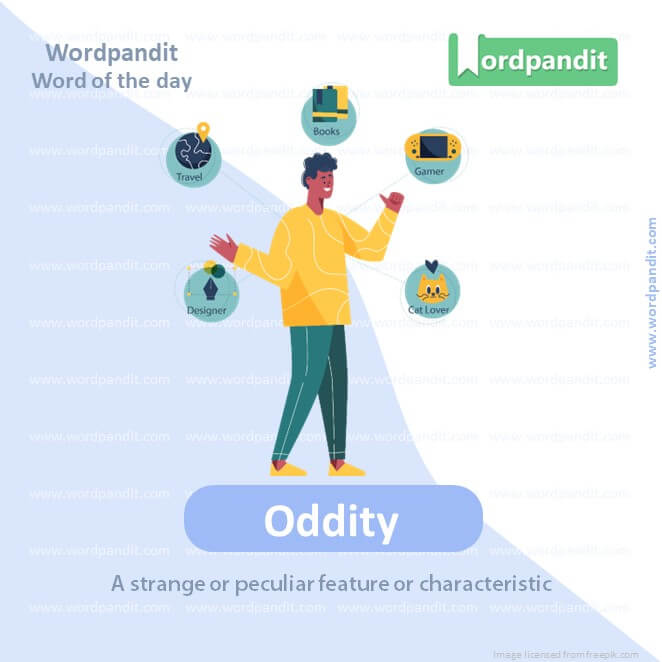
WORD-2: Oddity
CONTEXT: The sculpture was an oddity among the contemporary pieces, reminding viewers of a bygone era.
SOURCE: The Guardian
EXPLANATORY PARAGRAPH: An oddity is something that is strange or different. Like a pink elephant in a group of gray ones.
MEANING: A strange or peculiar feature or characteristic (noun)
PRONUNCIATION: ODD-ih-tee
SYNONYMS: Anomaly, Rarity, Unusualness, Quirk, Aberration, Peculiarity, Irregularity
USAGE EXAMPLES:
1. The blue tree was an oddity in the green forest.
2. She kept a collection of oddities in her room.
3. The town is known for its historical oddities.
4. His latest invention is an oddity, but it’s fascinating.
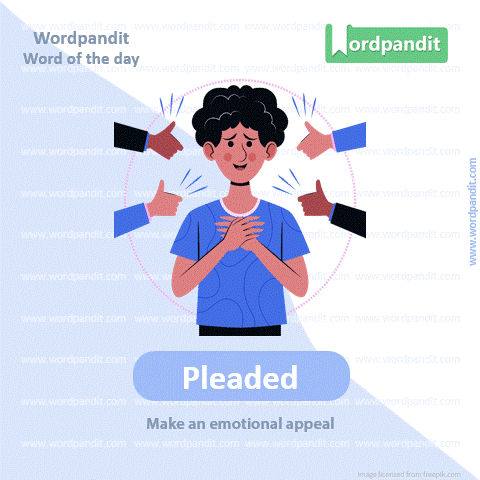
WORD-3: Pleaded
CONTEXT: The defendant pleaded not guilty, despite the overwhelming evidence presented against him.
SOURCE: The Washington Post
EXPLANATORY PARAGRAPH: “Pleaded” is when you ask for something really, really strongly, like when you beg your parents for an extra piece of candy.
MEANING: Make an emotional appeal (verb)
PRONUNCIATION: PLEED-ed
SYNONYMS: Beg, Implore, Entreat, Beseech, Appeal, Urge, Supplicate
USAGE EXAMPLES:
1. He pleaded for another chance.
2. She pleaded with the judge to reduce her sentence.
3. The child pleaded for more ice cream.
4. They pleaded with their teacher to postpone the test.
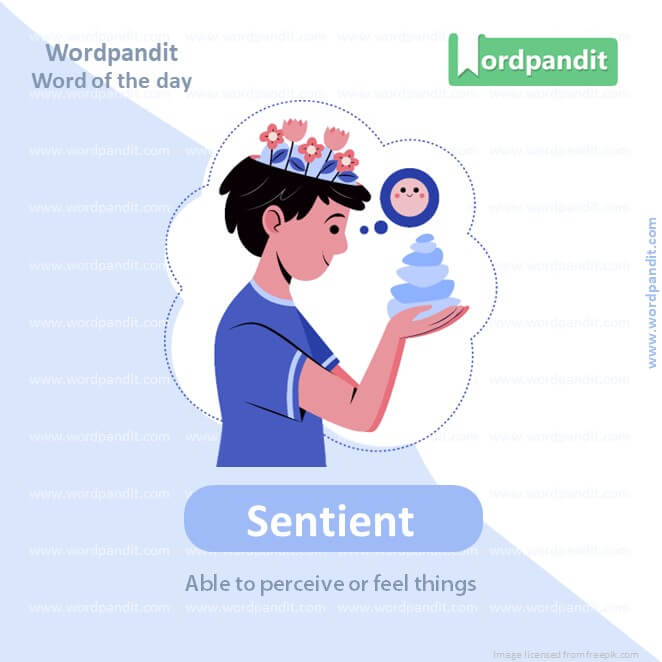
WORD-4: Sentient
CONTEXT: Some scientists argue that certain machines might one day become sentient, raising profound ethical questions.
SOURCE: Scientific American
EXPLANATORY PARAGRAPH: Imagine if your teddy bear could feel happy or sad, and could think on its own. That would mean it’s “sentient”. It means something can feel and think.
MEANING: Able to perceive or feel things (adjective)
PRONUNCIATION: SEN-shi-ent
SYNONYMS: Conscious, Aware, Feeling, Responsive, Living, Perceptive, Sensible
USAGE EXAMPLES:
1. Humans are sentient beings.
2. The movie explored the idea of sentient robots.
3. Animals are sentient and can feel pain.
4. The novel featured a sentient planet.
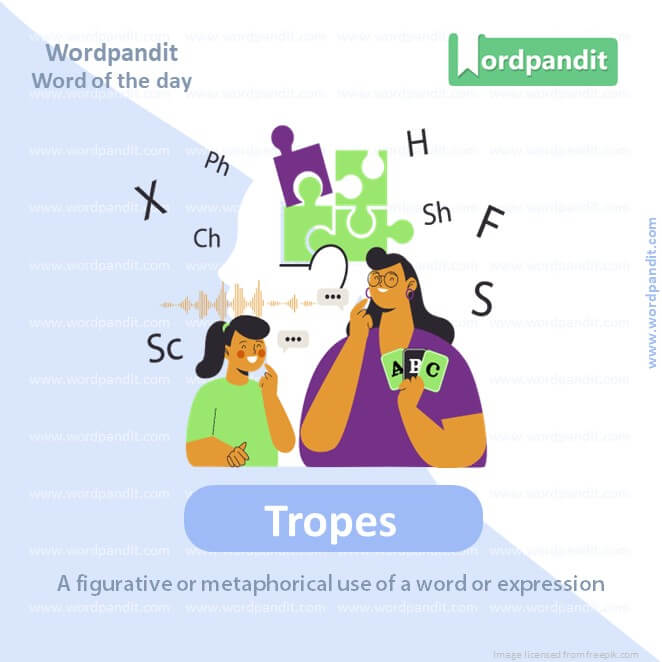
WORD-5: Tropes
CONTEXT: Modern filmmakers are challenging old cinematic tropes, pushing boundaries to tell stories in innovative ways.
SOURCE: BBC
EXPLANATORY PARAGRAPH: A “trope” is like a pattern or a familiar idea in a story. Like how superheroes usually wear capes or the idea of a knight saving a princess.
MEANING: A figurative or metaphorical use of a word or expression (noun)
PRONUNCIATION: TROHPS
SYNONYMS: Clichés, Patterns, Motifs, Formulas, Commonplaces, Conventions, Stereotypes
USAGE EXAMPLES:
1. The movie relied on several old tropes.
2. The story avoided common tropes and felt fresh.
3. She was tired of the same romantic tropes in novels.
4. Using certain tropes can make a story predictable.
WORD-6: Subversive
CONTEXT: The artist’s subversive works have been both criticized and lauded for challenging societal norms.
SOURCE: Al Jazeera
EXPLANATORY PARAGRAPH: “Subversive” is like when someone quietly tries to change things or go against the usual way of doing things.
MEANING: Seeking to undermine or overthrow something established (adjective)
PRONUNCIATION: sub-VER-siv
SYNONYMS: Rebellious, Revolutionary, Insurgent, Seditious, Dissident, Radical, Dissenting
USAGE EXAMPLES:
1. The book had a subversive message.
2. The artist’s work is considered subversive by the government.
3. They were spreading subversive ideas.
4. The movie has a subversive undertone.
WORD-7: Waning
CONTEXT: The waning influence of the traditional powerhouses has given rise to new geopolitical dynamics.
SOURCE: The Economist
EXPLANATORY PARAGRAPH: When the moon looks like it’s getting smaller in the sky, it’s “waning”. It’s like when your ice cream is slowly melting away.
MEANING: Decreasing in size, intensity, or power (verb)
PRONUNCIATION: WAY-ning
SYNONYMS: Diminishing, Declining, Reducing, Ebbing, Shrinking, Lessening, Dwindling
USAGE EXAMPLES:
1. The waning moon was barely visible.
2. Their enthusiasm was waning.
3. There’s a waning interest in that old game.
4. The power of the empire was waning.
WORD-8: Frivolous
CONTEXT: Critics dismissed the proposal as frivolous, arguing it lacked substance and feasibility.
SOURCE: The Guardian
EXPLANATORY PARAGRAPH: “Frivolous” is like when you buy a toy just because it looks fun but you don’t really need it. It means something is not really important or serious.
MEANING: Not having serious value or purpose; silly (adjective)
PRONUNCIATION: FRIV-uh-lus
SYNONYMS: Trivial, Superficial, Flippant, Unimportant, Petty, Inconsequential, Nonessential
USAGE EXAMPLES:
1. She spent her money on frivolous things.
2. The judge dismissed the frivolous lawsuit.
3. They engaged in frivolous chatter.
4. He was known for his frivolous behavior at parties.
WORD-9: Damned
CONTEXT: In his latest novel, the protagonist is a damned soul seeking redemption in a chaotic world.
SOURCE: The Washington Post
EXPLANATORY PARAGRAPH: “Damned” is a strong word to say something is bad or doomed. It’s like when a toy is so broken that it can’t be fixed.
MEANING: Condemned or doomed, often used for emphasis (adjective)
PRONUNCIATION: DAM-ned
SYNONYMS: Doomed, Cursed, Condemned, Accursed, Jinxed, Blighted, Ill-fated
USAGE EXAMPLES:
1. The damned machine won’t work.
2. He felt like a damned soul.
3. That’s the last damned time I trust him.
4. They sailed on the damned ship.
WORD10: Fierce
CONTEXT: The competition was fierce, with teams from all over the world vying for the top spot.
SOURCE: BBC
EXPLANATORY PARAGRAPH: “Fierce” is when something is really strong or intense. Like a lion roaring or a big storm.
MEANING: Very strong or intense; violent or aggressive (adjective)
PRONUNCIATION: FEERS
SYNONYMS: Intense, Ferocious, Violent, Aggressive, Fiery, Strong, Powerful
USAGE EXAMPLES:
1. The lion gave a fierce roar.
2. The competition was fierce.
3. She has a fierce determination to succeed.
4. The storm was so fierce, it knocked down trees.
Vocabulary English Grammar
Delving into the vast universe of language learning, the ‘Vocabulary English Grammar’ acts as a beacon, illuminating the path to mastery. This synergy of words and rules forms the quintessential framework of the English language. However, understanding ‘Vocabulary English Grammar’ in-depth requires a fine-tuned strategy.
First and foremost, understanding ‘Vocabulary English Grammar’ goes beyond only remembering rules and words. It involves learning how a word functions in a grammatical context. To achieve this, resources like textbooks, online grammar guides, and interactive language learning apps prove to be very valuable.
However, embracing ‘Vocabulary English Grammar’ calls for consistent practice. Adopting thematic learning, where you concentrate on a specific grammatical concept and the vocabulary related to it, can be particularly effective. Reading material like articles and books, or engaging with podcasts and films can provide a real-world context to these concepts.
The key to mastering ‘Vocabulary English Grammar’ lies in constructing sentences. Instead of memorizing disconnected words and rules, start framing sentences. This active application significantly bolsters comprehension and provides practical insight into how grammatical rules govern the use of words.
To truly excel in ‘Vocabulary English Grammar’, it’s important to seek feedback. Participate in language exchange platforms or conversation clubs. These platforms provide an opportunity to apply what you’ve learned and obtain constructive feedback on your progress.
In essence, understanding ‘Vocabulary English Grammar’ is a step-by-step process that requires thoughtful learning, constant practice, application, and proactive feedback. By embedding these techniques into your language learning routine, you can confidently navigate ‘Vocabulary English Grammar’. Remember, mastering ‘Vocabulary English Grammar’ is not about perfection, but about progression and communication. Each rule learned, each word comprehended, brings you closer to the fluency in your English language journey.











